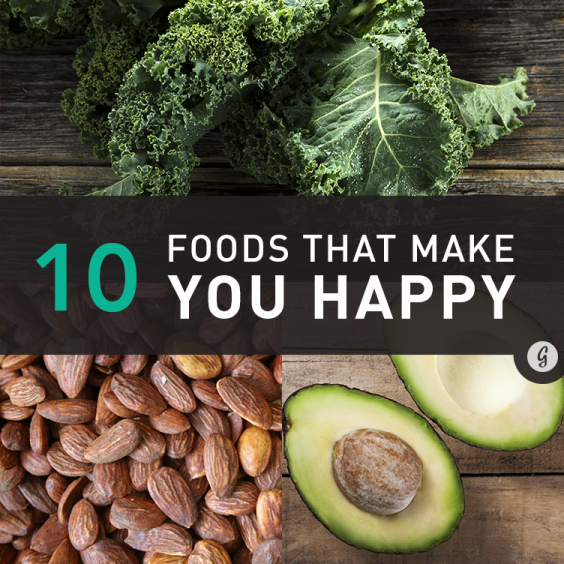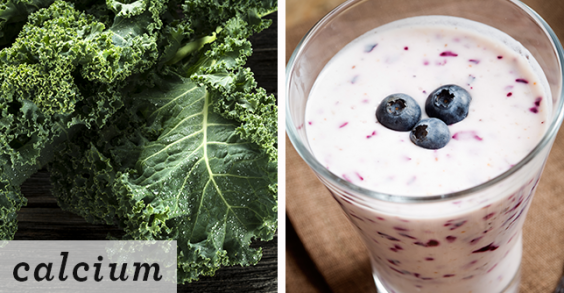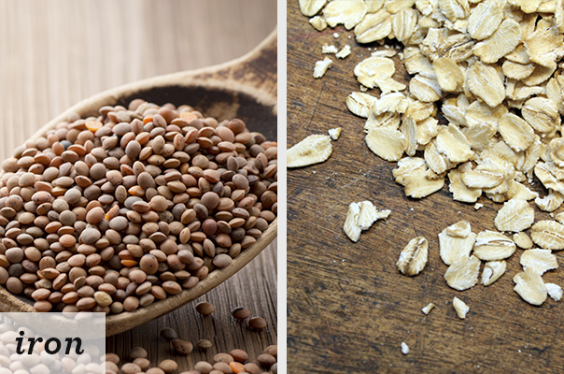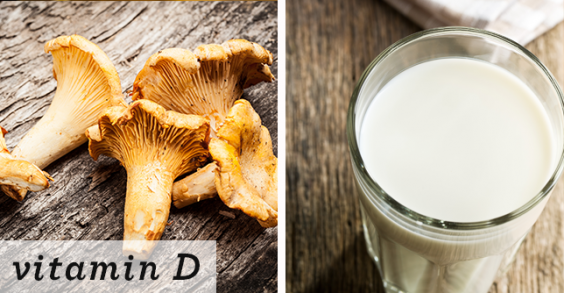http://greatist.com/happiness/nutrients-boost-mood
10 Nutrients Scientifically Proven to Make You Feel Awesome
Want some pep in your step? Perhaps a dash of good cheer? (Who doesn’t, right?). Look no further than the grocery store’s shelves. Foods rich in vitamins, minerals, and fatty acids are not only super healthy, but can also increase happiness, lessen symptoms of depression, and quell anxiety .
How can foods improve our moods? It all comes down to the brain. A healthy cognitive system is essential to regulating mood, and certain nutrients have a profound impact on maintaining normal brain function . To date, researchers have studied the association between foods and the brain and identified nine nutrients that can combat depression and boost our mood: calcium, chromium, folate, iron, magnesium, omega-3 fatty acids, vitamin B6, vitamin B12, vitamin D, and zinc . Try one of these foods for a mid-day pick-me-up, to promote long-term happiness, or to ward off the nagging worry that you forgot to lock the front door (You did remember, right?).
A bit about the units used below: Mg (milligram) is the typical unit of measurement for nutrients and 1,000 mg equals 1 gram. Mcg is the abbreviation of microgram and 1,000 mcg equals 1 mg.
1. Calcium
The most abundant mineral in the body, calcium plays an important role in maintaining strong bones and healthy blood vessels, and in reducing the risk of Type 2 diabetes. Low levels of calcium may play a role in PMS-related depression in particular . (Sorry guys, we couldn’t find data on whether calcium can also regulate male fluctuations in mood). Calcium deficiency affects more women than men, so women should take special care to meet the daily requirements .
How eating it helps: Found in a variety of sources (non-dairy included), calcium is often paired with vitamin D to help regulate mood fluctuations attributed to PMS . Since estrogen plays a large role in calcium production, calcium consumption may improve PMS-related depression .
RDA: 1,000 mg per day for adults
Food Sources of Calcium:
- Collard greens (frozen) (1 cup): 357 mg
- Ricotta (part skim) (1/2 cup): 308 mg
- Yogurt (plain/low fat) (3/4 cup): 310 mg
- Milk (1 cup, 1%, low-fat): 305 mg
- Kale (frozen) (1 cup): 179 mg
2. Chromium
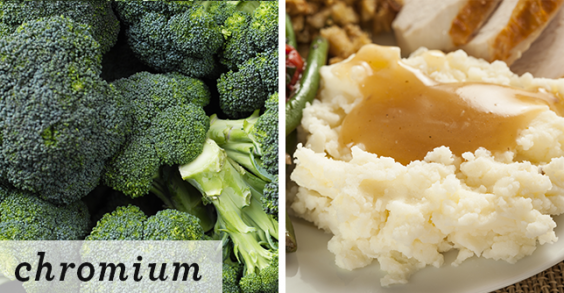
A trace mineral found in small amounts in the body, chromium helps the body metabolize food . A lack of chromium hurts the body’s ability to regulate insulin (the hormone that regulates sugar) and may lead to diabetes-related complications like vision loss and high blood pressure .
How eating it helps: Chromium plays an important role in increasing the brains’ level of serotonin, norepinephrine, and melatonin, which help the brain regulate emotion and mood . Because chromium works directly with the brain’s mood regulators, it’s been found to be an effective treatment of depression .
RDA: 25 mcg per day for women; 35 mcg per day for men
Food Sources of Chromium:
- Broccoli (1/2 cup): 11 mcg
- Grape juice (1 cup): 8 mcg
- Whole-wheat English muffin (1 piece): 4 mcg
- Potatoes (mashed) (1 cup): 3 mcg
- Turkey breast (1/3 cup): 2 mcg
3. Folate
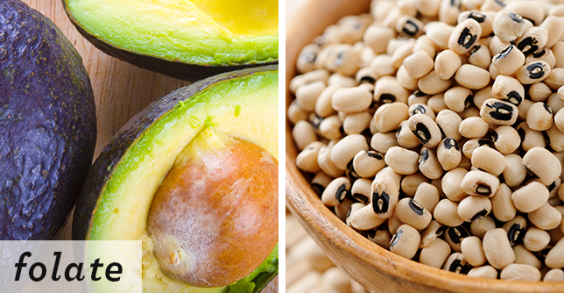
Folate (alternatively known as B9 or folic acid) helps the body create new cells and supports serotonin regulation. Serotonin passes messages between nerve cells and helps the brain manage a variety of functions, from determining mood to regulating social behavior. Folate deficiency can cause fatigue in addition to lowering levels of serotonin .
How eating it helps: A pair of power nutrients, Folate and B12 are often paired together to treat depression . By itself, Folate has the added benefit of boosting the efficiency of antidepressants .
RDA: 400 mcg per day for adults
Food Sources of Folate:
- Spinach (1/2 cup): 131 mcg
- Black eyed peas (1/2 cup): 105 mcg
- Asparagus (4 spears): 89 mcg
- Brussels sprouts (1/2 cup): 78 mcg
- Avocado (1/2 cup): 59 mcg
4. Iron
Iron plays an important role in the body, from transporting oxygen to supporting energy levels and aiding muscle strength. Low levels of iron can lead to feelings of fatigue and depression . Iron deficiency appears more frequently in women than men, especially women of childbearing age .
How eating helps: Consuming enough iron will help prevent iron anemia (not enough iron), a condition that commonly affects women more than men. Keeping enough iron in the body is important, as the fatigue, apathy, and mood change associated with the iron deficiency can often lead to depression .
RDA: 18 mg per day for women; 8 mg per day for men
Food Sources of Iron:
- Fortified oatmeal (instant) (1 package): 11 mg
- Soybeans (1 cup): 8.8 mg
- Lentils (1 cup): 6.6 mg
- Beef Ribeye (1 5oz. fillet): 3.8 mg
- Turkey (dark meat) (1/3 cup): 2.0 mg
5. Magnesium
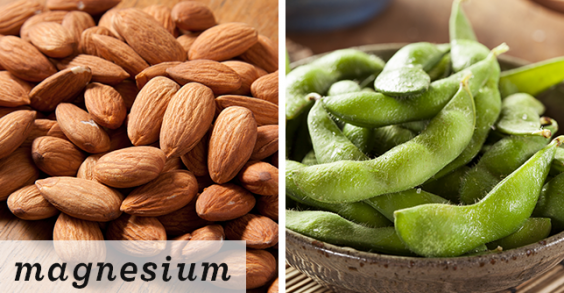
Magnesium is a mineral that plays over 300 roles in maintaining and protecting the body’s health. Deficiency can cause irritability, fatigue, mental confusion, and predisposition to stress.
How eating it helps: Magnesium plays a large role in the development of serotonin, which is a major contributor to feelings of happiness . Due to its ability to help regulate emotions, it’s a common element in homeopathic remedies for balancing mood .
RDA: 310 mg per day for women; 400 mg per day for men
Food Sources of Magnesium:
- Almonds (1/8 cup): 79 mg
- Spinach (1/2 cup): 78 mg
- Cashews (1/8 cup): 74 mg
- Peanuts (1/4 cup): 63 mg
- Edamame (1/2 cup): 50 mg
6. Omega-3s
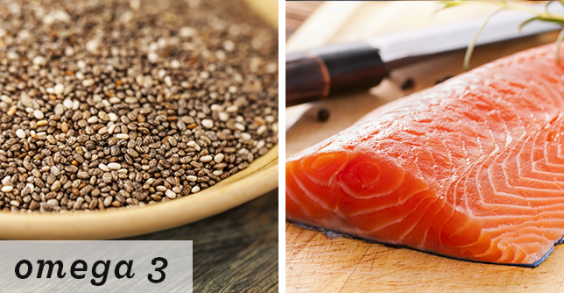
Omega-3 is an essential fatty acid that plays an important role in brain health and contributes up to 18 percent of the brain’s weight .The body does not naturally produce Omega-3s, so the fatty acid needs to be consumed from outside sources. Deficiency symptoms include fatigue, mood swings, memory decline, and depression.
How eating it helps: Studies show a correlation between consumption of fish with high levels of Omega-3 fatty acids and a decreased risk of depression and suicide . Whether eating fish or snacking on chia seeds, increasing your intake of omega 3 fatty acids may help combat depression .
RDA: There is no established RDA for Omega-3s, but the American Heart Association suggests eating a variety of fish (trout, herring, and salmon) at least twice a week. For vegetarians, there are also plenty of non-meat sources of Omega-3s (see below for a few suggestions). That said, the fatty acids found in plant sources are different from those found in marine sources, and it may be smart for vegetarians to consider using supplements that contain DHA Omega-3s (algae supplements are a popular way to do so) in order to derive maximum benefits.
Food Sources of Omega-3:
- Chia seeds (1/8 cup): 4915 mg
- Atlantic Salmon (1/2 fillet): 3982
- Chinese Broccoli (1 cup): 227 mg
- Atlantic Herring (1 5oz fillet): 3171 mg
- Spinach (1 cup): 381 mg
7. Vitamin B6
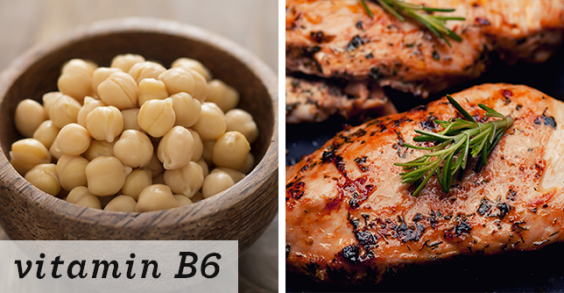
Vitamin B6 helps the production of neurotransmitters (which send messages from the brain to the rest of the body). Deficiency in B6 can cause short-term anemia; long-term effects include a weakened immune system, confusion, and depression.
How eating it helps: Consuming vitamin B6 is essential for regulating brain function, which influences our emotions . In addition to regulating healthy moods, Vitamin B6 is also an effective method for treating premenstrual depression .
RDA: 1.3 mg per day for adults
Food Sources of B6:
- Chickpeas canned (1 cup): 1.1 mg
- Yellow fin tuna (1/3 cup): 0.9 mg
- Salmon (1 3oz fillet): 1 mg
- Chicken breasts (1 piece, skinless and boneless): 0.5 mg
- Fortified breakfast cereals (3/4 cup): 0.5 mg
8. Vitamin B12
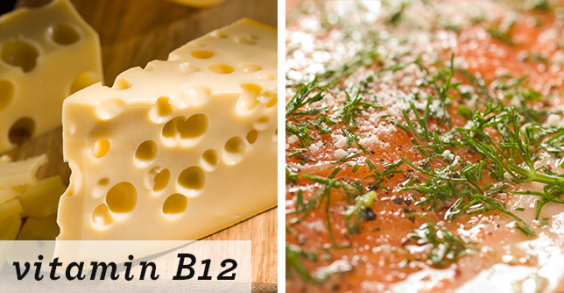
B12 is an essential element that aids in the creation of red blood cells and nerves. Low levels of B12 can cause short-term fatigue, slowed reasoning, and paranoia, and are associated with depression . Vitamin B-12 is found naturally in meats, eggs, and animal byproducts, meaning vegetarians and vegans have an increased risk of developing a deficiency.
How eating it helps: Because moods depend largely on signals from the brain, B12 plays an important role in regulating depression — consuming enough vitamin B12 allows the body to synthesize a group of nutrients critical for normal neurological function .
RDA: 2.4 mcg per day for adults
Food Sources of B12:
- Rainbow Trout (1 fillet): 9 mcg
- Sockeye Salmon (1 3oz. fillet): 17.6 mcg
- Swiss Cheese (1/8 cup): 4.4 mcg
- Mozzarella Cheese (1/8 cup): 3.0 mcg
- Tuna (canned in water)(1 small 3.5oz. can): 2.5 mcg
9. Vitamin D
Vitamin D helps regulate cell growth, plays an important role in maintaining the immune system, and (when paired with calcium) protects bones. Studies show that low levels of vitamin D are associated with depressive symptoms in both men and women . Most often, lowered levels of Vitamin D are the result of indoor lifestyles, limited sun exposure, and inadequate intake of vitamin-D-rich foods.
How eating it helps: If you’re feeling blue, increasing vitamin D could help ward off depression. Consuming the mood-regulating vitamin is important, especially during the wintertime when light from the sun (a natural producer of vitamin D) is limited .
RDA: 600 IU per day for adults ages 15 to 60
IU (International Unit) is a type of measurement typically reserved for Vitamin A, C, D and E. 40 IU’s of Vitamin D will equal 1 mcg.
Food Sources of Vitamin D:
- Egg (1 large, with yolk): 41 IU
- Salmon (1 3oz. fillet): 646 IU
- Swordfish (1/3 cup): 566 IU
- Chanterelle Mushrooms (1 cup) :114 IU
- Milk (1 cup): 115-124 IU
10. Zinc
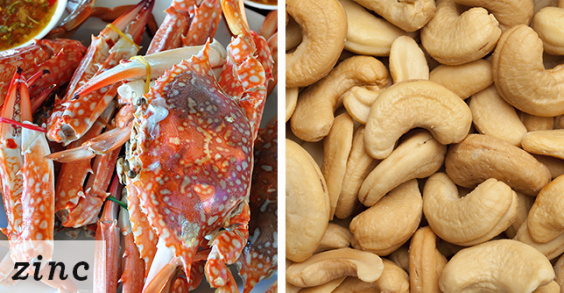
Zinc is found in almost every cell and plays an important role in supporting a healthy immune system and helping the body protect the gut from damage . Low levels of zinc in the diet can lead to a variety of ailments, including a weakened immune system, loss of appetite, anemia, hair loss, and depression. Vegetarians need as much as 50 percent more zinc than non-vegetarians due to the body’s lower absorption rate of plant-based zinc .
How eating it helps: Studies have identified zinc as an important factor in decreasing depressive symptoms, as the vitamin can improve the response of antidepressants while reducing the side effects of anti-depression medication . A lack of zinc can trigger depressive behaviors, so load up on zinc-rich foods to balance your mood .
RDA: 11mg per day for men; 8mg per day for women
Food Sources of Zinc:
- Roasted Pumpkin Seeds (1 cup): 9.5 mg
- Cashews (1 cup, dry roasted): 7.67 mg
- King Alaska Crab (1 leg): 10.2 mg
- Pork Loin (1 6-7oz. chop): 3.5 mg
- Swiss Cheese (1/8 cup): 1.2 mg
